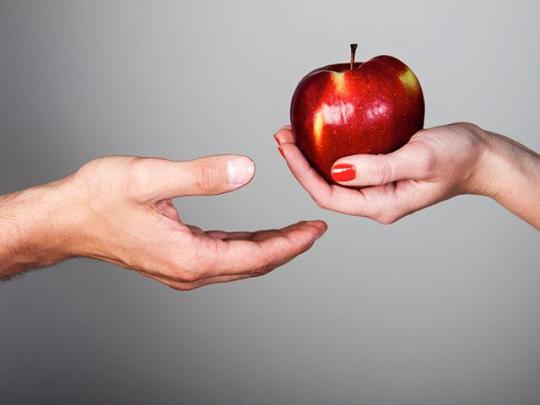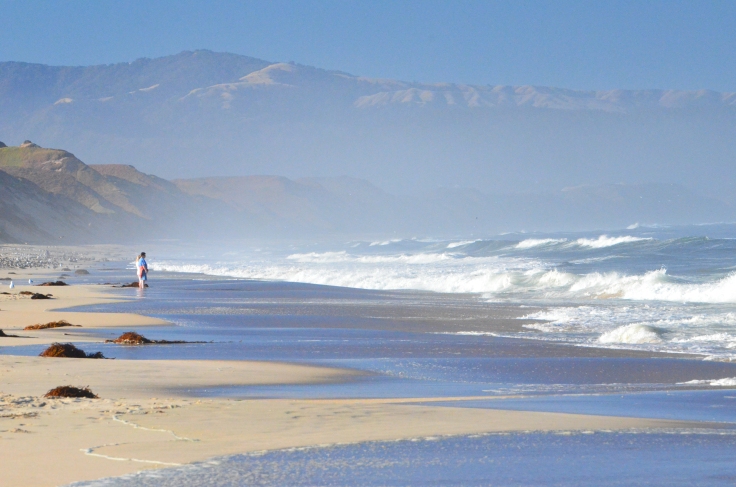God Made This Day
“When
times are good, be happy: but when times are bad, consider this: God has made the one as well as the other. Therefore, no one
can discover anything about their future.” Ecclesiastes 7:14
Imagine
yourself on a boat or small ship. You have sailed solo quite a distance and now
are out of view of any land. All around is only water and a clear sky and the
spring sun warmly shining down. The weather is perfect. The temperature is just
warm enough, perhaps in the low 70s, and the water is still. From time to time
small ripples wrinkle the water’s surface, but mostly it is smooth and unruffled.
You
stare at the sky that surrounds you. Every way you turn, the color is the same.
The sky is washed with the bright pastel blue of a cloudless day. You sit back
to take it all in breathing the air. There is nothing of earth about it; no
mud, no sand, no engine emissions. It smells like water, but more. You think
that if bread could be baked of simply H2O it would have this aroma. It is so
fresh you take one deep breath after another, which puzzles you. Rarely, if
ever do you pay attention to your breathing. But in this beautiful moment you
do.
You
scan the sky again, starting at the zenith above you and begin to follow the
palette of blue down to the horizon. The sky, a deep brushwork blue overhead,
turns lighter as it meets the horizon in a whitewash of cerulean.
The
water transforms the sky from its pale monochrome to a silvery mix of blue and
green. Even with very little wind, the surface of the water shimmers. With the
slightest breeze, tiny diamonds seem to burst and shine above the water. Your
sense of awe expands.
As you
take it all in over the early afternoon, you feel peaceful, calm and content.
This is the life. This is what my soul needed. This is why I bring my boat out
here. (Everyone knows you don’t really fish.) And in the sort of exclamation
that only comes from a satisfied and solitary place, you exhale loudly, “I am
so blessed!” And you are. And, even if you don’t believe in God, you still
would probably use the phrase. It just seems right.
But in
the moment of your reverie you feel the wind pick up a bit. Not much at first.
You’ve been on the water enough times to know the calm moment was a rarity. You
consider turning for shore, but you are not concerned quite yet. You want to
embrace the day and inner peace you are experiencing.
You
glance at the horizon again and now become concerned. The horizon has changed.
Now, above the water heavy cumulus clouds are building. Rising high above the
water with their flattened undercarriage, they are already dumping heavy rain
and are moving toward you. No longer silver, both the sky and water are boiling
into a deep and threatening gray.
The
water is choppier as the waves increase. All waves have two attributes:
frequency and amplitude. On the boat, you feel the frequency increase as the
waves are swept along by the wind. Frequency is simply the rate at which a wave
moves past a fixed location. It can also be expressed as the distance from one
quest to another in a moving wave.
Amplitude
refers to the height of the wave. It is measured from the trough, the lowest
part of the wave, to its crest. So, a three-foot wave is one that is 36 inches
from trough to crest. On the boat, not only are the waves coming more
frequently, but their amplitude has increased. What once perhaps rocked your
boat a bit now, with the greater force of higher waves, threatens to capsize
your vessel. Your perfect day is becoming a perfect storm. A few minutes before
you were saying, “I am so blessed!” Now, “Blessed” is the last word that comes
to mind. (You can substitute your own.)
The
Teacher in Ecclesiastes wants us to remember that life is just like that. We
can go on for days with everything going right, no major disruptions, our kids
obey us (or at least we think they do). We love our job, we have close friends
we enjoy, our marriage is, well, a good marriage. (Which means, yes, you fight,
but you work it out.) You haven’t received a speeding ticket in over a month,
rush hour traffic has been unusually light, and you even have enough savings to
take your kids on a vacation of a lifetime. You would say, “I am so blessed.”
The
Teacher tells us to be happy during these times. Don’t feel bad when things are
going well. Just like the man on the boat, drink in every good thing. Enjoy
when life goes well, and the storms are afar off.
But
then he asks us to consider something when things go poorly: “God has made one
(day) as well as the other.” Uh oh! In other words, when things get stormy and
everything you believed gets turned upside down, remember, God made that time (or
season) as well. It was easy for the man in the boat when the water was still,
and the sky was clear. It is easy for us when finances, family and friends,
health, plans and direction all seem to work out the way we expected. It is
easy to say, “I am so blessed!” Because we feel blessed. We
feel blessed by positive things: quality relationships, finances in good order,
etc. But we also feel blessed by negative things: no downsizing at work, very
little friction in relationships, etc.
Let
things go bad, though, and how well do we feel blessed now?
Come on, it’s just me typing this and you reading it; you can be honest. No
matter how often we are trained to say, “I’m too blessed to be stressed”, we
get stressed. And often for good reason. Storms can rise on open water at any
moment and from anywhere. And can they in life. You lose a job. You go through
a divorce. You are diagnosed with life-threatening cancer. You have medical
needs that have drained all your finances. Just imagine experiencing one of those
life events and exclaiming, “I am so blessed!”
But
that is not what the Teacher is advising. He is not asking us to evaluate if
God is in the good raise we got as well as our struggle with alcohol. He is
asking us to remember that God made both days. He did not
necessarily make the circumstances happen, but whatever circumstances do
happen: God is in that day.
I
believe this will make a difference for a lot of people. In the mid-90s I was
making over $60,000 per year; more than I had made in my life. For that time
our family was able to enjoy many experiences we wouldn’t have otherwise. But,
consider this. While my income increased, I had friends who were out of work
for years. Was God with me and not with them? Of course not. We were both
functioning on “the same day.” The same day I sold $50,000 of computer
equipment to a hospital a friend of mine was searching for work to support his
family. But we were both in that “same day”.
I
grant, when life is tough, it is really hard to say, “I am so blessed”. Here’s
a clue: Don’t say it. I have just ended an entire year without earning a penny.
I took early retirement for medical reasons and have been attempting to qualify
for Disability Insurance. Now living with relatives, not pastoring a church,
across the country from friends and a place we called home, I have found it
difficult to say, “I am blessed”.
Once I
considered this passage, though, I found myself able to say, “God has made this
day.” Dear one, no matter what you are going through, God is with you. You may
not feel “blessed”, and that is okay. Don’t let anyone put you down for that.
But, if you can find a way to say, “I may not feel blessed, but I know God is
with me, because He made this day just like any other,” it may bring you to a
place of hope. The day everything went right? God made it. The day when your
soul felt like it was boiling over? God made that one too.
God has
made this day.






.jpg)

![[Photo of road work]](https://www.rpcerie.org/images/road_construction.jpg)